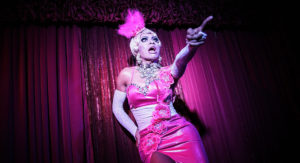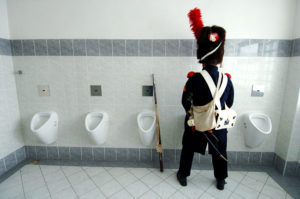“Jerry Sadowitz is a nasty piece of work. His venomous tirade is relentless, consisting of unabashed racism, homophobia, misogyny, antisemitism, xenophobia, and every other kind of prejudice known to humankind. If it exists, he hates it. The man is a monster. He’s also one of the best showmen on the Edinburgh Fringe.”
This was how I opened my review of Jerry Sadowitz’s show for ScotsGay magazine in 2008. I described his performance as “an explosion of hate on stage”, but noted that the effect was both prurient and deliriously funny. That Sadowitz’s unending bile is often interspersed with adroitly executed magic tricks makes his routines all the more compelling. When critics quote his jokes out of context, it’s easy to see why so many are offended — but when it comes to Sadowitz, context is everything.
Such a distinction, however, is lost on many of today’s comedy aficionados. This week, the Pleasance — one of the so-called “big four” venues at the Fringe — cancelled Sadowitz’s show at the Edinburgh International Conference Centre. In an incredible feat of doublespeak, Anthony Alderson, Director of the Pleasance, claimed that it is “a venue that champions freedom of speech” and does “not censor comedians’ material” but has nonetheless cancelled this show because it “is not acceptable and does not align with our values”.
There is much to criticise in Alderson’s statement, not least his high-handed claim that “this type of material has no place on the festival”. In recent years, the doyens of the comedy industry have developed a tediously pharisaic approach to the artform. Critics, promoters, and even comedians themselves have behaved like a modern-day clergy, censuring acts who fail to conform to the diktats of the new morality. The comedy industry, in other words, is seemingly dominated by those who are not comedy-literate.
The Pleasance Theatre Trust issued a further statement claiming that “opinions such as those displayed on stage by Sadowitz are not acceptable”, thereby revealing how little it understands about the essential theatricality of stand-up. Are “jokes” and “opinions” now synonymous? To take stand-up at face value, to attempt to apply moral guidelines to a theatrical performance, is to misapprehend the experience. Denouncing Sadowitz’s onstage persona as racist, sexist, or homophobic makes about as much sense as condemning Macbeth for his ruthless ambition.
Besides, Sadowitz isn’t the only one affected. The current trend of cancelling comedians is infantilising audience members by deeming them susceptible to corruption through their favourite shows. It is the identical view that underpinned Mary Whitehouse’s “Clean Up TV” campaign in the Sixties. For Whitehouse, it wasn’t sufficient that adults make choices about what they did or did not watch; authority figures were expected to intervene in order to prevent the spread of “dangerous” ideas that might lead the plebeians astray.
Anyone who has undertaken the least research into Sadowitz will know what they are in for. The Pleasance was certainly aware of his style and content (and his tendency to expose his penis) well in advance of the festival. Sadowitz had even posted a promo video in which he referred to himself in the third person, saying: “He’s gonna be funny. He’s gonna be rude. He’s gonna do magic tricks. He’s gonna do impressions. He’s gonna get his dick out. He’s gonna do every fucking thing.”
In another promo, Sadowitz said: “I might just do card tricks and say nothing for a whole hour or I might just do the usual ‘screaming fascist’ schtick. Or both. Patrons may wish to drink alcohol pre-show to avoid boredom, embarrassment and guilt.” His current show is entitled Not For Anyone. When I reviewed his show in 2008, it was called Comedian, Magician, Psychopath II. One can hardly accuse Sadowitz of false advertising.
So why is it that a show explicitly marketed at adults who enjoy controversial comedy would need to be cancelled? I have been told that some of the complaints originated from members of staff at the Pleasance itself — reminiscent of the revolt at the Canadian branch of Penguin Random House, where junior employees apparently burst into tears and demanded the cancellation of Jordan Peterson’s book, Beyond Order: 12 More Rules for Life. In Peterson’s case, the publishers refused to be cowed. At the Pleasance, the management capitulated.
This philistine trend gained momentum at the launch of the 2018 Edinburgh Fringe, when Comedy Awards director Nica Burns declared that she was “looking forward to comedy’s future in the woke world”. She went on to compare the current fashion for “woke” to the alternative comedians of the Eighties, claiming that “it is the woke movement which is setting an ever-evolving agenda as it seeks to establish a clear marker for what is unacceptable today”.
The implied decree was observed by up-and-coming comics in subsequent years; eligibility for awards or plaudits would be reserved for those who toe the ideological line. This is why I continually hear from stand-ups who are choosing to self-censor, who fear that their viability in the industry is contingent on maintaining the status quo. This is why we have seen so many second-rate acts promoted by the industry for conveying the “correct” message, one typically related to the new religion of Group Identity. This is also why so many television comedy shows are failing to attract viewers. For all the industry gatekeepers and their pretensions to moral superiority, comedy audiences would still much rather laugh than hear a sermon.
Burns had it entirely backwards when she compared the “woke world” to the alternative comedy movement. The complaints we hear today about subversive comedians like Sadowitz are strikingly reminiscent of the anger against the alternative comics of the Eighties, those who dared to challenge establishment norms. When I co-founded Comedy Unleashed, a monthly night in London, it was an effort to provide opportunities to those comics who are by nature non-conforming. It wasn’t about being controversial, it was about creating a show in which ideas could be explored freely, and where the priority would be to be funny rather than preachy.
The unhinged reactions to our recent announcement of a Comedy Unleashed tour have been revealing. One of the acts, Reginald D. Hunter, was trending for the day on Twitter because he had dared to appear on the bill. One comedian tweeted: “If you do that tour: you’re a fucking scab” and “Comedians need to pick a side: I’m an anarchist”. The comedian in question has a show on BBC Radio 4, so his definition of “anarchy” seems dubious at best.
Up until now, Sadowitz has been able to evade the accusatory finger-pointing of culture warriors — those who are determined to see racists and fascists in every shadow — by dint of his status as a luminary among comedians. Stand-ups who have admired Sadowitz for years will baulk at the suggestion that there is no distinction between his act and that of Roy “Chubby” Brown. But for those who have succumbed to the new puritanism, words have a contaminative power. Racist epithets are always racist; context be damned.
In a statement released yesterday, Sadowitz wrote: “I don’t want to humiliate the Pleasance but they are doubling down on their position and I don’t want to be made the victim of that… My act is now being cheapened and simplified as unsafe, homophobic, misogynistic and racist… A lot of thought goes into my shows and while I don’t always get it right… I am offended by those who, having never seen me before, hear words being shouted in the first five minutes before storming out without listening to the material which I am stupid enough to believe is funny”.
Sadowitz’s frustration is palpable, and rightly so. It is similarly frustrating to see him forced to break character publicly — possibly for the first time in his career — simply because a few know-nothings with too much power cannot comprehend the notion of an onstage persona and its function in stand-up. We have reached a point where the art of comedy has been demeaned by a “progressive” view of language and power relations. Consider how the tax lawyer and Twitter activist Jolyon Maugham responded to an opinion piece about the attack on Salman Rushdie. He claimed that when it comes to free speech, one should “engage with relative power. Who has a platform to speak — and for what purpose do they use it, to challenge or to embed power?”
This is the basic formulation to which all artistic expression is now reduced. So when Sadowitz screams racial slurs, he is not doing so as part of an unhinged comedic persona, but is perpetuating power structures that maintain his privilege. That he is Jewish doesn’t seem to matter because, as David Baddiel has argued, Jews don’t count.
We have seen comedians investigated by police, members of the public prosecuted for jokes, and the Culture Secretary suggesting that the law ought to be changed to criminalise controversial comedy on streaming services. At each step on this road to Pandemonium, mainstream comedians have remained silent, as though it is of no concern to them that their craft is being subjected to continual battering. There is nothing particularly surprising about the cancellation of Sadowitz’s show; it was simply a matter of time.
Perhaps now that the new puritans are targeting respected comedians like Sadowitz, other stand-ups will wake up to the problem. Comedy cannot exist in an environment where words are deemed to be “unsafe”, and risk-takers are punished with cancellation. This is why Sadowitz deserves your support, even if you cannot stomach his performances. He is one of the few comedians who has been instrumental in pushing boundaries. God forbid we allow these pettifogging authoritarians to re-establish the parameters in accordance with their banal and bloodless creed.
Disclaimer
Some of the posts we share are controversial and we do not necessarily agree with them in the whole extend. Sometimes we agree with the content or part of it but we do not agree with the narration or language. Nevertheless we find them somehow interesting, valuable and/or informative or we share them, because we strongly believe in freedom of speech, free press and journalism. We strongly encourage you to have a critical approach to all the content, do your own research and analysis to build your own opinion.
We would be glad to have your feedback.
Source: UnHerd Read the original article here: https://unherd.com/





